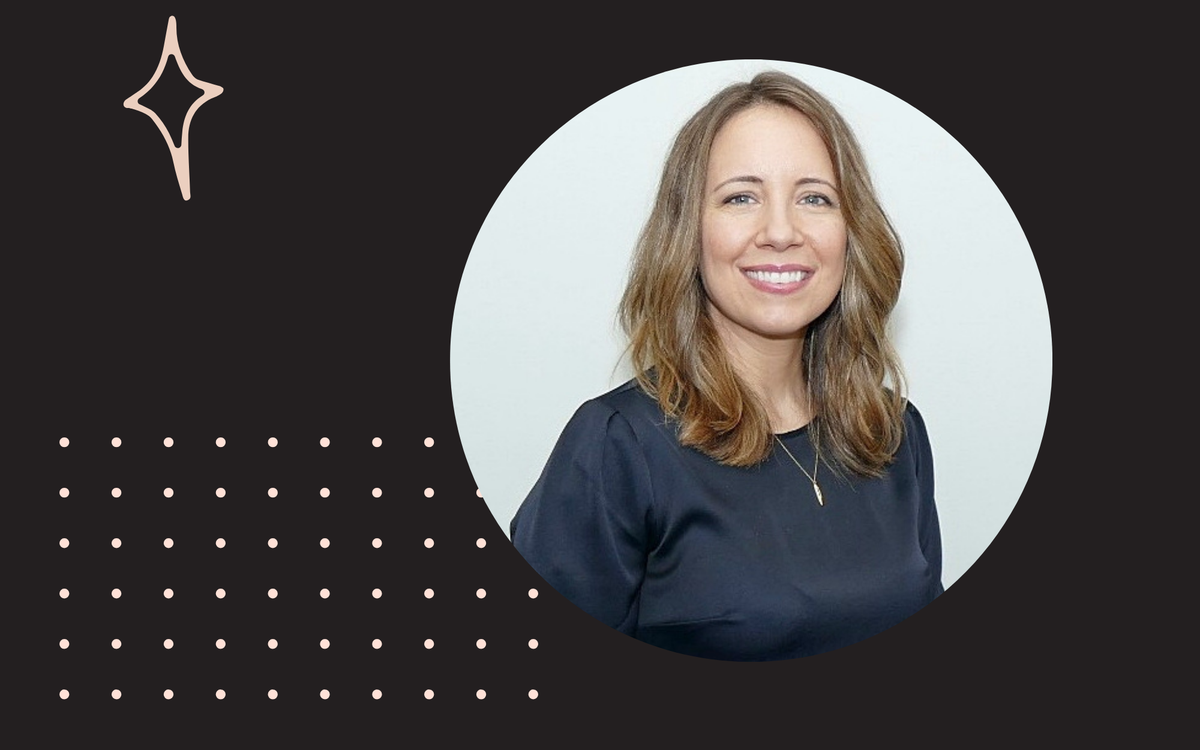Building Community in Mental Health: A Conversation with Jennifer Larson on Leadership, Innovation, and the Future of Therapy

In the evolving landscape of mental health care, few practitioners have demonstrated the vision and commitment to community-building like Jennifer Larson, LCPC, NCC. As the founder and owner of Concentric Counseling & Consulting, Jennifer has transformed what began as a solo private practice in 2010 into a thriving group practice that serves Chicago's downtown Loop and North/Northwest neighborhoods.
Established in 2013, Concentric Counseling & Consulting emerged from Jennifer's recognition that she could "contribute and help as many people as a practitioner in a group practice" and her desire to "be a part of something bigger." The practice has since become a model for collaborative mental health care, where therapists meet regularly with one another to provide support, clinical consultation, and coordination of care – an approach that sets them apart in the field.
With over 25 years of experience in the mental health industry, Jennifer is a Licensed Clinical Professional Counselor (LCPC) and National Certified Counselor (NCC) who specializes in anxiety disorders, relationship issues, complex trauma, and family-of-origin work. Beyond her clinical expertise, she has emerged as a thought leader in mental health accessibility and professional development, regularly providing supervision and consultation to emerging therapists throughout the Chicagoland area.
Her commitment to social responsibility extends beyond the therapy room. Concentric has donated counseling services to students at neighborhood Chicago Public Schools and partnered with The Kennedy Forum and The Chicago Community Trust to host community discussions aimed at combating mental health stigma.
In this conversation, Jennifer shares insights from her journey as both a clinician and entrepreneur, discusses the systemic challenges facing mental health accessibility, and offers her perspective on preparing the next generation of therapists for an evolving field shaped by technology, social media, and changing cultural attitudes toward mental health.
As a licensed psychotherapist and founder, what inspired you to establish your own practice, and how do you balance the dual roles of clinician and entrepreneur?
At some point during my life, I felt a strong desire to create and own a business that reflected my life's desire and work. From a young age, I had learned to be self-reliant, and I wanted the freedom to shape my own path and build something meaningful. Since my teenage years, I have worked hard and consistently, taking on many jobs in different environments and organizations. Some of the jobs included working at a hair salon, clothing and a shoe store, restaurants and wine, dishwashing, a medical illustration department, and a large HMO.
In my early 20s in Wisconsin, during my undergrad years, I began intentionally focusing on jobs in the mental health field, setting the stage for a future as a mental health provider. My graduate internship at a private practice group in Arizona reinforced my goal of eventually becoming a psychotherapist in private practice.
Throughout my varied work experiences, I learned which bosses, mentors, organizations, and roles I appreciated, and which ones I did not. These experiences helped shape the characteristics and values I wanted to emulate and develop. After working at two large community-based mental health agencies and a group practice in Chicago, I opened my own solo private practice. However, I very much missed aspects of being part of a group and longed to return to that sense of community. I wanted to draw on my previous experiences by creating a group practice where everyone could learn from one another, support each other's growth, and provide a range of services, as well as enjoy a sense of community where we could get together outside of work and have fun. In 2013, I founded Concentric Counseling & Consulting, a group practice in Chicago.
Earlier in my career, transitioning into the roles of caseworker and psychotherapist came more easily to me than moving from a solo private practice to establishing a group practice. My foundation as a therapist was stronger, given my education in sociology, psychology, and clinical psychology and varied work experiences in mental health, as well as my own lived experiences, including my own struggles and successes with mental health. However, I had little experience or training in leadership or business operations. I hadn't taken any college courses in those areas, so I didn't always emulate or achieve the leadership qualities I hoped for during the early days of my group practice. There were many growing pains and a steep learning curve.
I have learned over the years achieving balance can require at times first experiencing imbalance. In recent years, it became clear I needed to focus more on my leadership and operational roles at my group practice. I have dedicated more time to strengthening these skills, including participating in an Authentic Leadership Training program for group practice owners and meeting regularly with other practice owners for ongoing learning and support. I look forward to continuing to learn and grow as a leader and group practice owner.
What are the most significant challenges you've observed in mental health accessibility, and how is your practice working to address these barriers?
There are several challenges in making mental health accessible, especially at the systemic level. In certain cultures and subcultures, there is still a stigma attached to mental health, discussing it openly, and seeking therapy. This stigma creates barriers to accessing services and treatment. Thankfully, there have been some positive trends. For example, some schools have incorporated social-emotional learning (SEL) into their curriculum, starting in elementary school and continuing through high school. Younger people are generally more comfortable talking about their mental health and sharing information, including on social media. The COVID pandemic brought greater awareness and more conversations about the importance of mental health. Progress has been made, but it is usually limited to smaller pockets of communities, not on a larger level. There is still significant work to be done.
Cost and insurance issues are also major barriers, making it difficult for some people to access and afford healthcare, including mental health services. This is a systemic problem, as many people in our country lack access to adequate healthcare. Everyone deserves healthcare, and it's unfortunate this is not universally the case.
On the provider side, at least in Chicago, insurance companies have done little to increase reimbursement rates for mental health providers since 2006, when I began working in private practice. This lack of progress is both demoralizing and unjust. Mental health providers often feel undervalued by insurance companies, especially compared to providers in other disciplines, not to mention operating expenses of our work continue to rise. Because of this, many psychotherapists limit the number of insurance companies they work with or accept only self-pay clients. I don't fault providers for making these decisions. This does though cause a ripple effect that further restricts access for those with certain insurance plans.
To address stigma and barriers to mental health care, at Concentric Counseling & Consulting, we have taken several steps. We have partnered with organizations such as The Kennedy Forum Illinois and The Chicago Community Trust, hosting #BreaktheSilence OnTheTable2017 conversations at Millennium Park to encourage open dialogue about mental health and addiction. We share information and educational content through blog posts and social media, with plans to expand these efforts in the very near future. We also accept graduate students and interns, which allows us to offer sliding-scale rates to those who are uninsured or facing financial hardship. Additionally, we donated our services for one year to elementary school students at our local Chicago Public School (CPS). We support bills such as Illinois House Bill 1085 and Senate Bill 55, which aim to improve mental health and substance use disorder treatment access by addressing insurance coverage and reimbursement rates (this is still in the works and hope they get passed by IL Congress and signed by our Governor). We continue to advocate by writing to state representatives and insurance companies for increased reimbursement rates.
In your role as a supervisor and consultant, what emerging trends do you see in mental health treatment, and how are you preparing the next generation of therapists for these changes?
Mental health and therapy continue to evolve, with a growing approach on integrative therapy and getting away from a one-size-fits-all approach. This is a more personalized approach to individuals, couples, relationships, and families, and in my opinion, is essential for helping people.
Social media continues to take on an influential role in the mental health space, serving as a tool for education, awareness, and connection. And more recently, AI has entered the field, bringing some understandable apprehension in our field. With any major universal and societal changes (such as the Internet, smartphones), initial resistance is natural as many want to live life as we know it and it is our primal instinct for self-preservation. I count myself among those who feel cautious (I am typically a late bloomer to certain big universal changes), but I also acknowledge that this shift is already underway and will only continue to grow and it's better to find ways to learn, adapt, and assimilate these changes while continuing to advocate for ethical, and human-centered mental health care. Undoubtedly, we will need to create space to learn and navigate how social media and AI can be both helpful and unhelpful in our industry.
I feel deeply privileged to serve as a supervisor and consultant to the next generation of therapists. This new generation brings a different type of openness toward mental health. Many of them have undergone years of therapy starting in their childhood or adolescent years and many are very comfortable talking about their own mental health. In fact, several graduate programs require students to participate in their own therapy. Not only does it support personal healing and growth, but it also fosters deep empathy and understanding of what it means to sit in the client's seat.
The therapists I supervise are typically self-aware and willing to explore their own vulnerabilities that naturally arise in their work with clients. This self-reflection practice is a foundational part of becoming a highly skilled and compassionate clinician. I'm continually inspired by their courage, insight, and willingness to show up fully. This generation is highly informed. They have access to more mental health information than ever before and are skilled at using and sharing it through social media. They're also strong self-advocates, a quality I greatly admire, especially having come from a generation where self-advocacy was not always encouraged.
That said, I also notice an emerging challenge. Some new therapists express preferences about which populations or client groups they don't want to work with, not necessarily due to lack of training or competence, but based on what I believe may be personal preferences. While I respect and understand the importance of aligning work with one's values and understand that we do need to find clinical areas of interest (one therapist can't treat everyone and every presenting concerns and needs), I do believe in the value of a growth oriented model. Working with a wide variety of clients can be one of the most enriching and powerful experiences in a therapist's growth and development. I have concerns therapists who want to limit themselves may experience certain limitations in the work they do with clients.
In some cases, I've heard about therapists who want to avoid working with clients based on their political beliefs. This is very concerning to me. As therapists, our ethical code calls us to serve people and not to discriminate. In a time when our country is highly divided, I believe our field has the potential to be a place of collective unity and healing, and I am concerned some therapists in the new generation who only want to work with people who are aligned with certain political parties, may possibly contribute to greater fragmentation.
Like many therapists, I know which clinical issues and populations I tend to work with best. But I also believe that stepping outside of our comfort zones can lead to unexpected and professional growth. I worry personal preferences may unintentionally contribute to division, rather than healing. It is my hope that we can continue guiding and supporting emerging therapists to balance self-awareness with professional responsibility, and to see the power in working across lines of difference. At Concentric, we have a few supervisors, including myself. My hope is that all of us who are in a supervisory role can continue to create space to have exploratory conversations with guidance and support around this emerging trend.
Ultimately, I feel honored to walk alongside this next generation. They are passionate, resourceful, and committed to mental wellness in ways that continue to inspire me. I know I learn a tremendous amount from the new generation of therapists and my hope is the younger generation of therapists will learn a tremendous amount from the older generation as well. We both bring tremendous value and it's wonderful when both generations of therapists can meet in a shared space where we learn and grow together.
Are you a woman leader with an inspiring journey to tell? Founded by Women is on a mission to elevate and amplify the voices of women making an impact.
If you're breaking barriers, driving change, or paving the way for others, we’d love to feature your story. Get in touch with us today!
👉 hi@foundedbywomen.org


